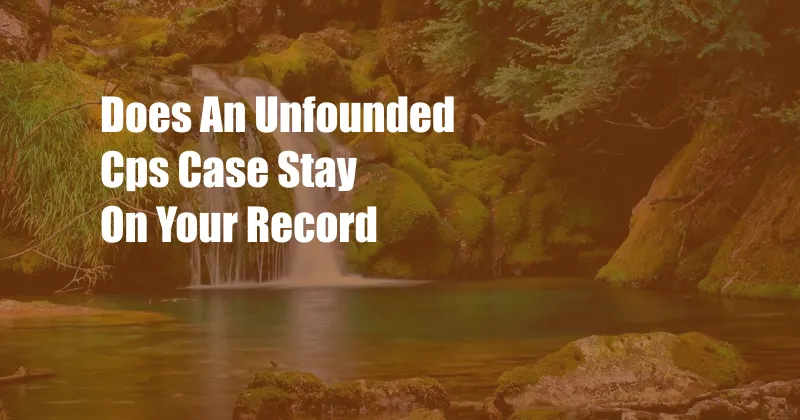
Does an Unfounded CPS Case Stay on Your Record?
An unwarranted Child Protective Services (CPS) case can be a harrowing experience. However, once an investigation is closed, what happens to the record? Does it linger on your record, leaving a perpetual shadow over your reputation and future opportunities?
Unfounded CPS Cases
An unfounded CPS case is one in which the agency determines there is no evidence to support the allegations of abuse or neglect. Investigations can be initiated based on anonymous tips, neighbor observations, or even misunderstandings. While unfounded cases are ultimately closed, they can still leave a mark on your record.
Record Retention and Access
CPS agencies are required to keep records of all investigations, including unfounded cases. The length of time records are retained varies by state, ranging from a few years to indefinitely. However, it’s important to note that these records are not publicly available. They can only be accessed by authorized individuals, such as social workers, law enforcement, or courts.
Expungement and Sealing
In some states, individuals who have been the subject of unfounded CPS cases may be eligible for expungement or sealing of the records. Expungement means that the records are permanently destroyed, while sealing means they are hidden from public view but can still be accessed by certain authorities. The eligibility criteria and procedures for expungement and sealing vary widely from state to state.
Impact on Future Opportunities
An unfounded CPS case can have a negative impact on future opportunities, such as employment, housing, or adoption. Potential employers, landlords, and adoption agencies may request access to your CPS records. While unfounded cases should not be a basis for discrimination, they can still raise red flags and lead to rejection.
Tips for Dealing with an Unfounded CPS Case
If you have been the subject of an unfounded CPS case, here are some expert tips:
- Document everything. Keep a record of all interactions with the agency, including phone calls, meetings, and correspondence.
- Cooperate with the investigation. Answer questions honestly and provide any requested documentation.
- Seek support. Talk to a lawyer, therapist, or trusted friend or family member.
- Understand your rights. Know your legal rights and options, such as expungement or sealing of records.
FAQ on Unfounded CPS Cases
Q: How long do unfounded CPS cases stay on record?
A: The length of time records are retained varies by state. Contact your local CPS agency for specific information.
Q: Can I get unfounded CPS cases expunged or sealed?
A: Eligibility for expungement or sealing varies by state. Consult with an attorney for guidance.
Q: Can an unfounded CPS case affect my job prospects?
A: Potential employers may request access to your CPS records, and an unfounded case could raise concerns.
Q: What if I have been discriminated against due to an unfounded CPS case?
A: File a complaint with the appropriate authorities, such as the Equal Employment Opportunity Commission (EEOC).
Conclusion
While unfounded CPS cases do not typically remain on public record, they can still have an impact on your life. By documenting interactions, cooperating with investigations, and understanding your rights, you can mitigate potential consequences. If you have been the subject of an unfounded CPS case, seek support and explore your options for expungement or sealing.
Are you interested in learning more about unfounded CPS cases? Contact your local CPS agency, consult with an attorney, or join support groups for individuals who have experienced similar situations.